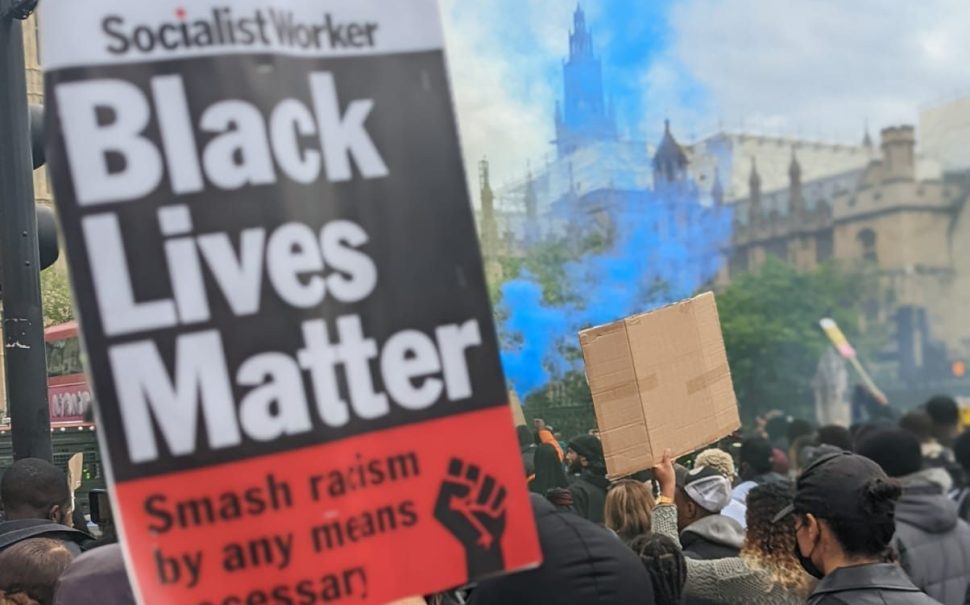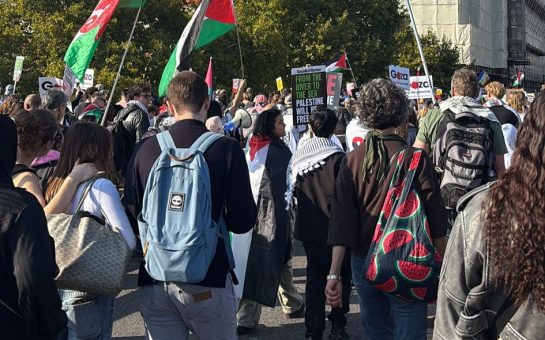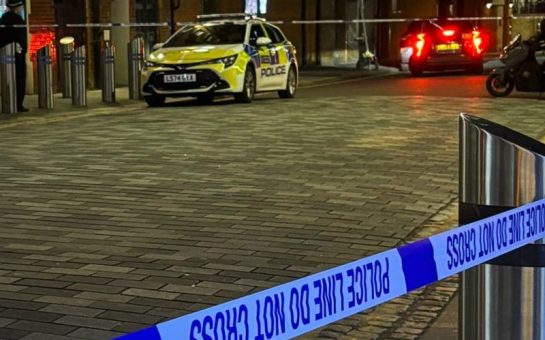Members of Parliament backed calls for the immediate suspension of the police officer who shot Chris Kaba.
Bell Ribeiro-Addy, MP for Streatham where 24-year-old Kaba was killed last Monday night, and Harriet Harman, MP for Camberwell and Peckham, signed a letter calling it ‘incomprehensible’ the officer was not suspended.
The letter said: “We are calling on the Met to suspend the officer today. Even moving him out of firearms duties or into back-room duties would not be sufficient in view of the seriousness of this matter. It must be suspension and it must be now.”
Kaba is the second black man to die after contact with the Metropolitan Police this year.
Protestors took to the streets of central London at the weekend. Credit: Neggeen Sadid
Oladeji ‘Deji’ Omishore died on 4 June 2022 following multiple use of Taser, delivering a shock of 50,000 volts, by police on Chelsea Bridge.
The Omishore family has demanded that officers who tasered the vulnerable 41-year-old be investigated and suspended.
The family also called for an investigation into ‘misinformation’ following the Metropolitan Police’s false claim that Omishore was ‘armed with a screwdriver’.
Thousands of protesters took to the streets in central London on Saturday over the death of Kaba, as people gathered to pay their respects to the Queen.
“We lost a queen, but we also lost a young king,” said one speaker.
“The fact that the Queen has died at 96 years old and someone’s died at 24 years old: we need some questions as to why someone has died that young.”
“It’s a bit more shocking that someone has died at 24 years old, and being chased down and shot, that deserves more answers at the moment,” said Maxwell Deer, a 22-year-old engineer, who feared that the investigation would be overshadowed by reporting on the Queen’s death.
Maxwell Deer, 22, at the protest. Credit: Neggeen Sadid
The protest took place amid fears the homicide investigation launched by the Independent Office of Police Conduct on Friday would not result in criminal prosecution.
“A criminal investigation does not mean that criminal charges will necessarily follow,” the watchdog said.
Veteran anti-racist campaigners, activists and family members stated the family’s demands and rallied protestors to continue the long fight for justice.
Kaba’s cousin and the family’s spokesperson, Jefferson Bosela, 27, said he ‘cried on the floor, absolutely inconsolable’ on hearing the news. As he spoke, Kaba’s mother, Helen Nkama, and other family members wept.
“One word that remained at the forefront of my mind, one word that I kept repeating to myself, one word that I felt I needed the answer to, that word was ‘why’,” said Bosela.
Bosela said the family’s demands were the immediate suspension of the officers, a swift criminal investigation with a clear timeline, and the release of body camera and other footage recovered.
A father-to-be and MOBO-nominated drill rapper, Kaba died at 9.51pm on Kirkstall Gardens in Streatham Hill by a single gunshot following a police pursuit in which a tactical maneuver called a ‘box and stop’ was used.
Rights groups have long campaigned against the tactic which by itself can cause fatalities.
The IOPC confirmed Kaba was unarmed – no firearm was found in his vehicle or in the vicinity.
There have been 1,833 deaths following contact with the police in England and Wales since 1990, according to INQUEST, a charity providing expertise on state-related deaths and their investigation to bereaved families.
There have only ever been three successful criminal prosecutions of police for deaths following police contact.
Sergeant Alwyn Sawyer of Merseyside Police was convicted of the manslaughter of Henry Foley in 1985, and Inspector Ellerker and Sergeant Kitching of Leeds Police were convicted of assault for the death of David Oluwale in 1969.
PC Benjamin Monk was convicted of manslaughter for the death of Dalian Atkinson in 2016.
Deborah Coles, the director of INQUEST, said: “The disproportionality in the use of force against black people adds to the irrefutable evidence of structural racism embedded in policing practices.”
Grime artist and philanthropist Stormzy spoke to protestors gathered in front of New Scotland Yard.
“I just encourage everyone to have stamina,” he said.
“It’s a very difficult thing to say, it’s not even nice, because no-one should have to have the stamina to go on a journey like this: the stamina to get justice or the stamina to go and get answers.
“When they [the police] do these things they get away with it because what happens is you do this once and you get tired and tweet and you get tired. Do it for a week, for two weeks or a month and you get tired. They know we get tired.
“I just encourage everyone, whatever you can do in your capacity – do whatever you can do. Whether it’s coming to this march, whether it’s supporting this family directly. As much as we feel the pain we don’t feel anything compared to what the Kaba family are feeling.”
Many at the march, like Samantha, a 26-year-old nursery nurse, were personally affected.
“He was my little sister’s childhood friend. And it happened down the road from where I live,” she said.
Fearing police brutality, she has considered leaving London for her children’s safety.
“You think sometimes – do you still want to be here? You don’t feel safe, you don’t want to bring up your children here,” she added.
After the protest, dozens of Kaba’s friends and loved ones gathered at the corner of Kirkstall Gardens, where he was killed.
On one side of the road was a shrine of flowers and candles.
Two young women, who did not wish to be identified, said, “Maybe don’t shoot first. Maybe ask questions.”
They wanted the police to ‘treat everyone the same’, adding, ‘we would just hope all black men are treated like white men’.
At one point, three young men debated the merits of the word ‘demand’ in relation to the calls for justice.
“Demand. It shouldn’t be a demand, we shouldn’t have to ‘demand’ justice.”
They explained that justice should be ‘normal’ and ‘expected’, and that, as black men, they simply wanted to be treated equally.
“How are they going to be treated? Do they need to ‘demand’ justice?,” they said pointing across the road where a group of white people stood.
The three men said the impact of racism on their lives had been profound. “We all have our stories, each one of us.”
“Me, I lost my 20s in jail for something I didn’t do. Joint enterprise,” one man said.
On Kaba, he said: “He loved music. He loved his family, he loved his family so much.
“He was funny – too funny. He was one of a kind. There’ll be no other like him.”





